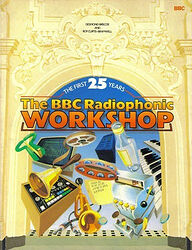
Product prices and availability are accurate as of the date/time indicated and are subject to change. Any price and availability information displayed on Amazon site(s) at the time of purchase will apply to the purchase of this product.
 |
||
|
|
||
|
|

Description: As the title suggests, this is a history of the BBC’s legendary electronic music/sound effects department the Radiophonic Workshop, including a whole chapter on the creation of the iconic Doctor Who theme music by Delia Derbyshire in 1963. Cover blurb: Everyone has heard the Doctor Who signature tune and is familiar with the grating noise the Tardis [sic] makes when it takes off; millions listened with amazement to the explosive, eerie sounds from The Hitch Hiker’s Guide to the Galaxy. But how are these sounds made, and who creates the weird and wonderful surreal ‘noises’ which are now so familiar to the listening and viewing public? This book is the story of how the BBC’s Radiophonic Workshop grew from a number of enthusiasts experimenting with musique concrete into a fully-fledged centre for making electronic music and experimental radio programmes. Desmond Briscoe, Head of the Radiophonic Workshop and one of the pioneers of the new sounds, recalls the machines and objects which made these sounds possible — early tape machines, the oscillators and wobbulators, mixing desks, the bottles, bells, musical instruments, domestic impedimenta... and, most importantly, the people who manipulated the sounds into bizarre, often beautiful, shapes. He and his present colleagues (sometimes known as Concrete Mixers) talk about the ‘glowpot’ desk, the request for ‘a cosmic scream’ and the sound of ‘the end of the world’, the advent of the computer synthesiser and their feelings about the machines they work with and the music they make. The Radiophonic Workshop, at first thought to be capable only of producing ‘nasty noises with no future’, has helped change the listening habits of the country. | |||||||||||||||||||||||||||||||||||||||||||||||||||||||
| Go back | ||